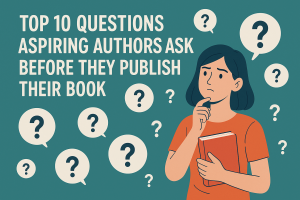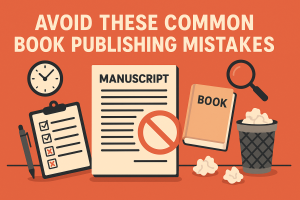In the world of publishing, there exists a fascinating paradox: many of the most influential books bearing the names of famous business leaders, celebrities, and public figures were not actually written by them—at least, not entirely. This is not a scandal or a secret in the publishing industry; it’s a standard practice known as ghostwriting.
Behind countless bestsellers, inspirational memoirs, and industry-changing business books stands a silent partner—a ghostwriter whose name rarely appears on the cover but whose words and expertise bring the subject’s ideas to life. Ghostwriting services have become the backbone of celebrity and executive publishing, allowing prominent figures to share their stories and insights without dedicating years to mastering the craft of writing.
This relationship between renowned figures and professional writers represents a powerful symbiosis that benefits both parties, as well as readers who gain access to valuable knowledge that might otherwise remain uncaptured. As the publishing landscape evolves alongside technological developments like AI writing tools, understanding the continuing value of human ghostwriting becomes increasingly important.
In this comprehensive exploration, we’ll uncover why so many business leaders and celebrities turn to ghostwriters, what qualities make for exceptional ghostwriting partnerships, and how this practice enriches our collective literary landscape rather than diminishing it.
The Time Paradox: Why Busy Professionals Need Ghostwriters
The Reality of Executive and Celebrity Schedules
The most precious commodity for high-profile individuals isn’t money—it’s time. Business leaders often work 60-80 hour weeks managing companies, making strategic decisions, and handling countless responsibilities that cannot be delegated. Their days are scheduled in 15-minute increments, with meetings, travel, and critical decision-making filling every available moment. Similarly, celebrities juggle film shoots, recording sessions, brand partnerships, and public appearances that can span multiple continents within a single week.
Writing a book is not a casual weekend project. Professional authors typically spend anywhere from six months to several years crafting a high-quality manuscript. The process involves extensive research, countless drafts, rewrites, and meticulous editing—all requiring sustained focus and cognitive energy. For business leaders running global companies or celebrities managing demanding careers, allocating this kind of time to writing simply isn’t feasible.
This is where professional ghostwriting services become invaluable. By partnering with a skilled ghostwriter, executives and celebrities can translate their experiences, expertise, and insights into compelling narratives without sacrificing their primary responsibilities. The best ghostwriting company will employ writers who can efficiently extract thoughts and stories through interviews conducted during the limited windows of availability that busy professionals can offer.
The Preservation of Valuable Knowledge
Beyond time constraints, there’s another compelling reason why ghostwriting makes sense: the preservation of valuable knowledge that might otherwise be lost. Many successful individuals have accumulated extraordinary wisdom and experiences that deserve to be shared, even if these individuals lack the time or writing skills to document them properly.
Consider the business leader who transformed an entire industry or the celebrity who overcame tremendous obstacles to achieve success. Their stories contain lessons that could inspire and instruct countless others. Without ghostwriters, many of these narratives would remain untold, and their insights would never reach the broader audience who could benefit from them.
Professional ghostwriters act as knowledge translators, taking the raw material of experiences and expertise and shaping it into accessible, engaging content that retains the voice and perspective of the named author while presenting it in the most compelling way possible. In this sense, ghostwriting services provide a valuable bridge between those who have knowledge worth sharing and those who could benefit from receiving it.
The Craft of Writing: Specialized Skills That Matter
Writing as a Distinct Professional Expertise
One common misconception is that anyone who is successful in one field should naturally be skilled at writing about that field. In reality, writing is a specialized craft requiring distinct abilities that often have little overlap with the skills that make someone an excellent business leader, athlete, or performer.
Professional writing demands a deep understanding of narrative structure, pacing, language usage, and audience engagement. It requires the ability to organize complex ideas into coherent arguments, maintain consistent tone throughout hundreds of pages, and craft prose that keeps readers invested. Just as we wouldn’t expect a bestselling author to suddenly excel at running a Fortune 500 company or starring in a blockbuster film, it’s unreasonable to assume that successful individuals in non-writing fields would naturally produce compelling manuscripts.
The qualities of a professional ghostwriter extend far beyond basic writing competence. Elite ghostwriters combine journalistic interviewing skills, psychological insight, research capabilities, and storytelling expertise. They must be chameleons capable of adapting to the voice and perspective of their clients while elevating the material through their craft. This unique combination of skills takes years to develop and represents a professional expertise as specialized as law, medicine, or executive leadership.
The Value of Professional Refinement
When readers purchase a book, they expect a polished, engaging experience that meets professional standards. They want insights delivered in an accessible, compelling format that respects their time and attention. Professional ghostwriters ensure that the valuable knowledge of business leaders and celebrities reaches audiences in a form that honors both the subject matter and the reader’s experience.
The best ghostwriting company will employ writers who not only capture their clients’ voices and ideas but who also understand the publishing market, genre expectations, and current literary trends. They know how to structure information for maximum impact, how to maintain narrative tension, and how to create an emotional connection with readers. These skills transform what might otherwise be rambling anecdotes or disjointed observations into cohesive, powerful books that leave a lasting impression.
In many ways, ghostwriters serve a function similar to other professional service providers that successful individuals rely upon. Just as a CEO might engage financial advisors, legal counsel, and management consultants to maximize effectiveness in specialized areas, they engage ghostwriting services to ensure their ideas are communicated with maximum impact and professionalism.
Preserving Authenticity: The Voice Behind the Name
Capturing the True Voice and Perspective
Perhaps the most persistent criticism of ghostwriting is the concern about authenticity. Critics question whether a book can truly represent someone’s thoughts if they didn’t physically write every word. This perspective, however, misunderstands the nature of the ghostwriting relationship when done properly.
The best ghostwriting services don’t fabricate or impose their own views—they extract, organize, and refine the genuine perspectives of their clients. Through extensive interviews, observation, and immersion in their client’s speaking patterns and thought processes, skilled ghostwriters become conduits for authentic expression rather than creators of artificial content.
In fact, one could argue that a professional ghostwriter might sometimes capture a person’s true voice more effectively than they could themselves. Many people speak more naturally and authentically than they write. The pressure of writing can lead to stiff, formal language that bears little resemblance to how someone actually communicates. A talented ghostwriter observes how their client speaks when relaxed and passionate about a topic, then translates that natural energy and authentic expression to the page.
The Ethical Framework of Professional Ghostwriting
Professional ghostwriting operates within a clear ethical framework that distinguishes it from plagiarism or misrepresentation. The relationship is consensual and transparent (within the industry, if not always publicly), with the named author providing the core ideas, experiences, and perspectives while the ghostwriter contributes structure, language, and narrative expertise.
The qualities of a professional ghostwriter must include a strong ethical foundation that respects the boundaries of this relationship. Good ghostwriters don’t impose their own agendas or perspectives. They ask probing questions, listen carefully, and develop a deep understanding of their clients’ authentic positions before crafting content that accurately represents those positions.
This ethical practice extends to research as well. When ghostwriting for business leaders or subject matter experts, professional ghostwriters conduct thorough research to ensure factual accuracy and proper context. They verify claims, check statistics, and help their clients avoid factual errors or misleading statements that could damage credibility.
The Collaboration Spectrum: From Full Ghostwriting to Editorial Support
Understanding Different Levels of Writing Support
Ghostwriting exists on a spectrum rather than as a binary arrangement. At one end is complete ghostwriting, where the named author provides ideas and information through interviews, and the ghostwriter crafts the entire manuscript. At the other end is heavy editorial support, where the named author creates rough drafts and a professional editor substantially rewrites and restructures the content.
Between these extremes lie various collaborative approaches:
- Collaborative writing: The named author and ghostwriter work closely together, with both contributing direct writing to different sections based on their strengths.
- Developmental ghostwriting: The named author provides detailed outlines or rough content, and the ghostwriter expands and refines this material.
- Interview-based ghostwriting: The ghostwriter conducts extensive interviews and uses transcripts as the foundation for creating content in the subject’s voice.
- Research-intensive ghostwriting: The ghostwriter conducts both interviews and independent research to develop comprehensive content with minimal time investment from the busy named author.
The best ghostwriting company will offer flexible approaches tailored to each client’s unique situation, preferences, and level of desired involvement. Some business leaders may want to be deeply engaged in the writing process, reviewing and revising each chapter, while others might prefer a more hands-off approach, trusting the ghostwriter to develop content from interviews with minimal intervention.
The Role of Technology in Modern Ghostwriting
As with many professional fields, technology has impacted ghostwriting practices. Tools for transcription, research, and collaboration have streamlined certain aspects of the process. More controversially, some are exploring whether it’s possible to write a book with AI assistance, using artificial intelligence to generate content based on inputs from the named author.
While AI tools can assist with certain aspects of writing, they currently lack the critical human elements that make ghostwriting successful: emotional intelligence, deep contextual understanding, strategic thinking about audience reception, and the ability to ask insightful follow-up questions. A skilled human ghostwriter notices subtle cues during interviews—changes in tone, emotional resonance, moments of particular passion or hesitation—and uses these insights to develop more authentic, meaningful content.
The most effective approach in today’s environment likely involves human ghostwriters selectively using technology to enhance efficiency rather than replace the core interpersonal collaboration that makes ghostwriting valuable. For instance, AI might help with initial transcription of interviews or suggesting research sources, while the human writer handles the critical tasks of interpretation, synthesis, and creative expression.
The Business Case: ROI and Brand Building through Books
Books as Business Assets
For business leaders, the decision to invest in ghostwriting services often comes down to return on investment. A well-written book serves as a powerful business asset with multiple potential returns:
- Thought leadership positioning: A book establishes the author as an authoritative voice in their industry, opening doors to speaking engagements, media appearances, and consulting opportunities.
- Business development tool: Books serve as sophisticated marketing tools that demonstrate expertise and approach to potential clients or partners.
- Legacy documentation: For founders and long-term leaders, books preserve institutional knowledge and philosophy that might otherwise be lost.
- Internal alignment: Books articulating a leader’s vision can align organizational culture and provide a reference point for company values and direction.
- New business opportunities: The increased visibility from a successful book often leads to partnerships, investments, and expansion possibilities that wouldn’t otherwise emerge.
When viewed through this lens, the cost of professional ghostwriting services becomes a strategic investment rather than an expense. The time a business leader saves by not writing the book themselves can be directed toward revenue-generating activities while the ghostwriter handles the time-intensive work of crafting and refining the manuscript.
Building Personal Brand Through Publishing
For celebrities and public figures, books serve a somewhat different but equally valuable purpose. They provide an opportunity to:
- Control the narrative: In a world where others are constantly telling their story, a book allows celebrities to present their own authentic perspective.
- Add depth to public perception: Books enable celebrities to showcase intellectual dimensions and personal history that may not be evident through their primary professional work.
- Create direct connections with audiences: Books establish a more intimate relationship with fans than most other media formats.
- Diversify revenue streams: Successful books create additional income beyond primary career activities.
- Transition between career phases: Books can help reposition a celebrity for new professional directions or opportunities.
The investment in quality ghostwriting services pays dividends through enhanced public perception and expanded career opportunities. The best ghostwriting company will understand both the publishing market and the unique brand considerations relevant to public figures, ensuring the book strengthens rather than dilutes the celebrity’s established brand.
The Publishing Reality: Industry Expectations and Standards
How Publishing Decisions Include Ghostwriting Considerations
The publishing industry has long recognized the value of ghostwriting partnerships in producing marketable books from high-profile individuals. Major publishers regularly connect potential authors with ghostwriters or expect agents to arrange these collaborations before submission.
From the publisher’s perspective, ghostwriting often makes economic sense:
- Market reality: Publishers know that readers buy books by business leaders and celebrities primarily for their insights and stories, not their prose style. The named author’s expertise and platform drive sales more than their writing skills.
- Risk management: Publishers invest substantial resources in advances, editing, marketing, and distribution. Professional ghostwriters reduce the risk of late manuscripts, extensive rewrites, or content that fails to meet professional standards.
- Efficiency in production: Books developed with experienced ghostwriters typically require less editorial intervention and meet production schedules more reliably.
- Content quality assurance: Established ghostwriters understand narrative development, pacing, and reader engagement, increasing the likelihood of positive reviews and strong word-of-mouth promotion.
When seeking book publishing services, business leaders and celebrities should understand that publishers often prefer projects with professional writing support already arranged. This demonstrates seriousness and reduces the publisher’s risk, potentially leading to better contract terms and marketing support.
The Economics of Modern Publishing
The financial realities of contemporary publishing also drive the prevalence of ghostwriting. With publishers facing tight margins and increasing competition for reader attention, books must meet high standards of readability and engagement to succeed commercially.
Publishers typically evaluate potential books on three primary factors:
- The author’s platform: How many people already know and follow this person?
- The book’s content: How valuable, timely, and distinctive are the ideas?
- The quality of execution: How well-written, structured, and engaging is the manuscript?
While business leaders and celebrities often bring strong platforms and valuable content, they may lack the time or skills to execute at a professional level. Ghostwriting services bridge this gap, making otherwise unpublishable books viable commercial prospects.
The investment in professional ghostwriting can substantially increase a book’s chances of:
- Securing representation from a top literary agent
- Attracting offers from major publishers
- Receiving a larger advance
- Benefiting from more substantial marketing support
- Achieving higher sales and broader distribution
The Selection Process: Finding the Right Ghostwriting Partner
Key Qualities of a Professional Ghostwriter
Not all ghostwriters offer the same level of service or expertise. When evaluating ghostwriting services, business leaders and celebrities should consider these essential qualities of a professional ghostwriter:
- Empathetic listening skills: The ability to truly hear and understand the client’s perspective, values, and voice.
- Versatility in writing styles: Adaptability to match different tones, from conversational to authoritative.
- Research capabilities: Skills in verifying facts, exploring context, and adding depth to the client’s knowledge base.
- Strategic thinking: Understanding of how the book fits into broader career and business objectives.
- Publishing industry knowledge: Familiarity with current market trends, genre expectations, and publishing processes.
- Project management expertise: Ability to maintain momentum and meet deadlines throughout the lengthy writing process.
- Collaborative temperament: Willingness to serve the client’s vision rather than pursuing their own creative agenda.
- Absolute discretion: Commitment to confidentiality regarding the working relationship and sensitive information shared.
- Editorial judgment: Skill in distinguishing essential content from tangential material that might distract from core messages.
- Psychological insight: Capacity to help clients articulate thoughts they struggle to express directly and identify blind spots or inconsistencies.
The best ghostwriting company will employ writers who demonstrate these qualities consistently, matching clients with ghostwriters whose specific strengths align with project requirements.
Evaluating Ghostwriting Services: Beyond the Basics
When selecting among ghostwriting services, several factors deserve careful consideration:
- Track record: Has the ghostwriter or agency produced successful books in relevant genres? While confidentiality agreements may limit specific disclosures, established ghostwriters should be able to share some evidence of their experience.
- Process transparency: Quality ghostwriting services explain their methodology clearly, including interview approaches, research processes, revision protocols, and timeline expectations.
- Chemistry and communication: The relationship between ghostwriter and named author typically lasts months or years and involves sharing personal stories and perspectives. Personal compatibility matters significantly.
- Contractual clarity: Professional ghostwriting arrangements should have clear agreements regarding rights, confidentiality, revision limitations, timeline, and compensation structure.
- Support services: Some ghostwriting services include additional support like proposal development for publishers, editorial reviews, or assistance with book marketing.
- Client references: Speaking with previous clients about their experience can provide valuable insights into working with a particular ghostwriter or agency.
- Writing sample customization: Rather than relying solely on previous work, serious clients might request a paid sample based on an interview to evaluate how well the ghostwriter captures their voice.
The investment in finding the right ghostwriting partner pays dividends throughout the writing process and significantly impacts the quality of the final product.
The Digital Revolution: How Technology Changes Ghostwriting
Can AI Replace Human Ghostwriters?
As artificial intelligence advances, some wonder whether it might be possible to write a book with AI instead of human ghostwriters. Current AI writing tools can generate text based on prompts and even mimic certain stylistic elements, raising questions about the future of human ghostwriting.
However, significant limitations remain:
- Contextual understanding: AI lacks the deep comprehension of human experiences and emotions needed to create truly resonant narratives.
- Strategic questioning: Human ghostwriters ask probing follow-up questions that elicit deeper insights. AI cannot yet identify when a subject is glossing over important details or hasn’t fully articulated a key concept.
- Ethical judgment: Professional ghostwriters help clients navigate sensitive topics, potential controversies, and reputational risks—nuanced areas where AI lacks discernment.
- Originality and creativity: AI writing relies on patterns from existing texts rather than generating truly original insights or creative connections.
- Emotional intelligence: Human ghostwriters sense emotional undertones in interviews and understand which experiences carry special significance for their clients.
While ambitious individuals might attempt to write a book with AI assistance, the resulting work typically lacks the depth, authenticity, and strategic alignment that professional human ghostwriters provide. The best ghostwriting company will thoughtfully incorporate technological tools while maintaining the irreplaceable human elements of the craft.
Hybrid Approaches: Combining Human Expertise with Technological Efficiency
Rather than replacing human ghostwriters, technology is more likely to enhance their capabilities through:
- Enhanced transcription tools: Automated transcription of interviews with improved accuracy reduces administrative time.
- Research assistance: AI can gather preliminary research that human writers then evaluate and synthesize.
- Draft augmentation: Technology might suggest alternative phrasings or identify repetitive language patterns for human review.
- Project management improvements: Digital collaboration tools streamline the feedback and revision process.
These technological advancements may change how ghostwriters work, but they emphasize rather than diminish the value of human expertise in the process. The fundamental relationship between named author and ghostwriter—built on trust, understanding, and collaborative creation—remains central to producing books of lasting value.
Conclusion: The Enduring Value of Literary Partnerships
Why Ghostwriting Will Continue to Thrive
Despite technological developments and changing publishing models, the essential value proposition of ghostwriting remains compelling. Business leaders and celebrities will continue to have valuable insights worth sharing but limited time to craft them into polished manuscripts. The qualities of a professional ghostwriter—empathy, adaptability, discretion, and narrative skill—cannot be fully automated or outsourced.
Moreover, as information proliferates and attention spans fragment, the value of well-crafted, thoughtfully structured books increases. Books remain one of the few media formats that allow for deep exploration of complex ideas and comprehensive sharing of life experiences. This depth creates lasting impact that shorter formats cannot achieve.
For business leaders seeking to establish thought leadership and celebrities looking to deepen their connection with audiences, books will continue to offer unique advantages. And behind many of these impactful books, ghostwriters will continue their essential work—translating expertise and experience into prose that educates, entertains, and inspires.
Finding the Right Partnership for Your Story
If you have knowledge worth sharing but lack the time or specialized skills to craft it into a publishable manuscript, professional ghostwriting services offer a proven solution. Whether you’re considering writing a memoir, a business book, or a specialized work in your field of expertise, the right ghostwriting partner can transform your ideas into a book that serves your goals while respecting your authentic voice and perspective.
When evaluating book publishing services and ghostwriting options, focus on finding partners who demonstrate the qualities of a professional ghostwriter discussed throughout this article. The investment in quality ghostwriting typically pays dividends many times over—not just in book sales, but in expanded influence, new opportunities, and the satisfaction of sharing your knowledge in its most compelling form.
In the complex world of publishing, successful books rarely emerge from solitary effort. They are collaborative creations, built through partnerships between those with valuable knowledge and those with the skills to shape that knowledge into readable, impactful prose. This collaboration doesn’t diminish the authenticity or value of the resulting work—it enhances it, ensuring that important ideas reach the audiences who can benefit from them most.






